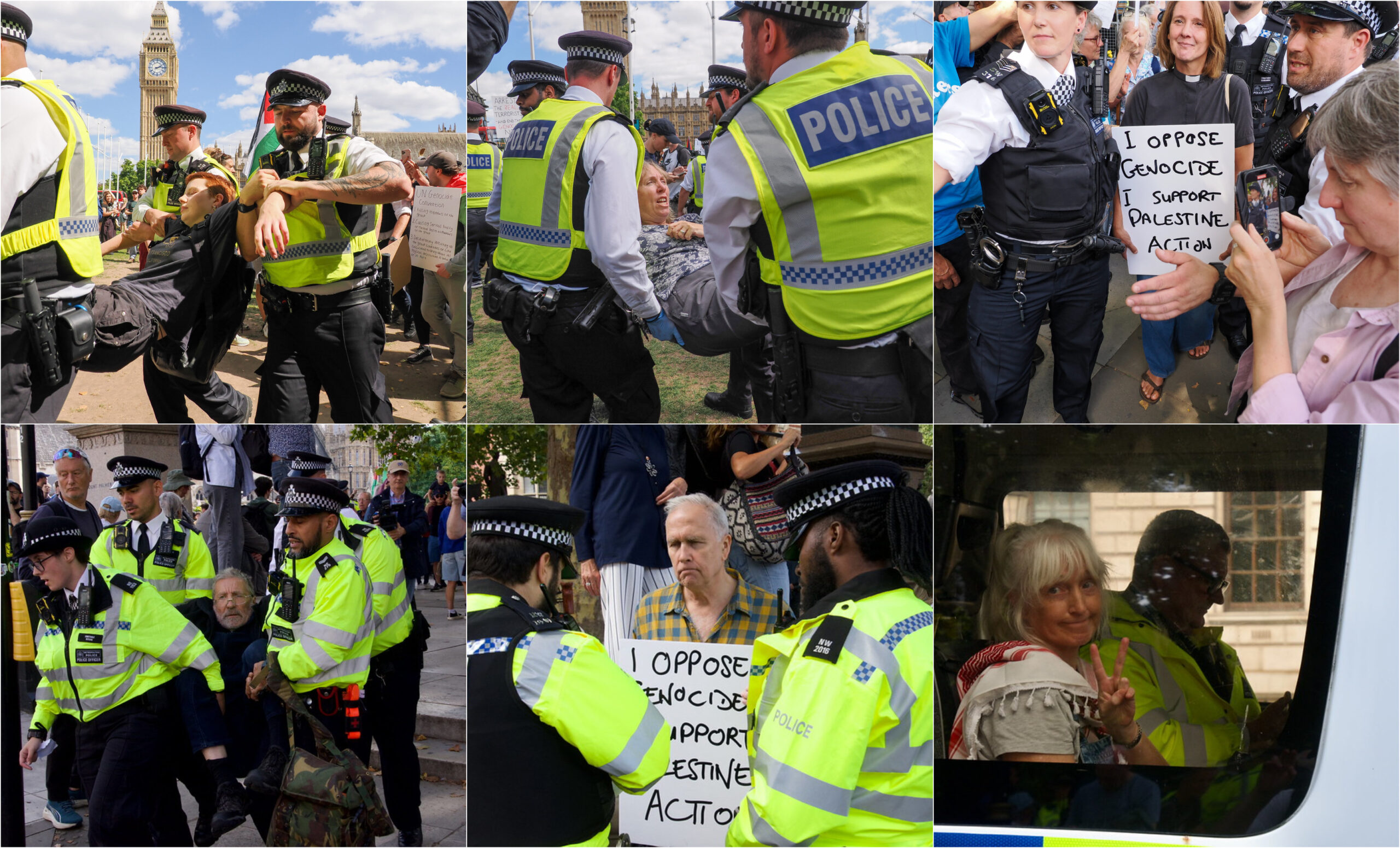
Photo: Aerial images taken on August 31, show cities in Sindh province, Pakistan submerged in floodwaters. (Credit: Ali Hyder Junejo/Flickr CC)
More than 1,300 people have died in floods in Pakistan, including 400 children. The floods, which began in June, are not only the deadliest in Pakistan’s history but also in the region since 2017. Three of the UK’s largest aid NGOs, Al-Khair Foundation, Lady Fatemah Trust and Muslim Hands, outline the situation on the ground.
Umar Rashid, Programs Manager, Muslim Hands
Pakistan is facing the most devastating floods in its entire history as torrential rains battered the nation, resulting in a third of the country being underwater. Over a thousand people have been killed, 1 million homes destroyed and 33 million affected in the provinces of Sindh, Balūchistān and South Punjab.
Earlier this month, I visited Dera Ghazi Khan, a city in the southwest of Punjab and one of the worst hit areas in Pakistan, on behalf of the international NGO Muslim Hands. Over 60 per cent of the population live below the poverty line and rely on agriculture to support their families.
🚨Umar Rashid on the ground: Pakistan has been devastated by the floods. Over 1200 people have lost their lives with tens and thousands injured. Over 60,000 homes have been either destroyed or damaged.
Donate nowhttps://t.co/lCKw3KVhIl#Pakistanfloods pic.twitter.com/uHsAY1b1Hy
— Muslim Hands UK (@muslimhandsuk) September 8, 2022
As I entered the district, I was faced with complete and utter devastation. Water was everywhere. The flood had wreaked havoc and occupied the lands of the families that once lived here, their crops destroyed. Just a few months prior, Pakistan was facing one of its hottest heatwaves that had impacted agricultural production and decimated crops, sparking food shortages. Animal carcasses were floating in the flood water. Homes had crumbled and all that remained were the foundations, which were only noticeable in areas where the water had slightly receded.
These homes are basic mud structures with no chance of withstanding the overwhelming torrent of water that this natural disaster had hurled at them.
I spoke with the beneficiaries that had stayed as they had nowhere else to go. Many of them were worried about their survival in the coming days, including Muhammad Idris, who had lost everything.
He told me, “The flood was unexpected and came as a shock to the community. We were not ready for this disaster. I am the breadwinner for my family, I lost everything in the flood, and I am helpless right now. There is water everywhere, and we do not have the resources to repair the damage. We are grateful for the food, water, and medical intervention we have been given, but we also want help to restore the home that we have lost, so we can get back to normal.”
Others had shared stories of the water reaching up to their necks and being fearful that they would not survive. Some had gone days without food, the only initial help given by NGOs like Muslim Hands. Many feel helpless and abandoned.
Muslim Hands has been responding to the crisis since the monsoon rains first struck in June.
Over £400,000 worth of aid has been distributed, reaching over 125,000 beneficiaries in the form of emergency food parcels, cooked food, medical intervention, and tents. However, other catastrophes are on the horizon for the people of Pakistan. With water everywhere, the humidity in the forty-degree air is the perfect breeding ground for mosquitoes, and the likelihood of the spread of malaria is high.
Other waterborne diseases such as cholera are rife and will target those most vulnerable, such as children and the elderly, potentially causing an overwhelming number of deaths.
As we prepare for the enormous challenges we will be facing this winter in the UK, it is difficult to ignore what the people of Pakistan will endure in the coming months when temperatures could drop to zero degrees, having little or next to nothing.
Over the past few days, we have witnessed an overwhelming response from the public at a time of economic crisis. In just a few days, Muslim Hands has seen over £355,000 donated, which will help us continue with our relief efforts, including rebuilding homes once the floodwaters disperse. For now, Muslim Hands will continue to give emergency relief in the hope that it will alleviate some of the difficulties the people of Pakistan are currently facing.
To donate to Muslim Hands Pakistan Flood Appeal, please click here.
Mukhtar Karim, CEO, Lady Fatemah Trust
In response to the recent floods, the Lady Fatemah Trust’s team on the ground started responding to the local needs as soon as they became apparent, well before they became newsworthy. We have been focused on working to increase food security in the more arid parts of the country like the provinces of Sindh and Balūchistān for over five years now, creating solar-powered farm irrigation programmes to
We are committed to supplying #emergencyfoodaid for families as well as looking at education, housing & income generation capacities in the longer term after the situation stabilises.
DONATE NOW:https://t.co/zlp33tEybE#pakistanfloods #pakistanfloodrelief #foodcrisis #lftrust pic.twitter.com/dxgZIDbKJN
— Lady Fatemah Trust (@LFTrust) September 14, 2022
The toll of extreme flooding on Pakistan’s food security is unravelling, with large swathes of farmland underwater, crops and stockpiles washed away, and homes and livelihoods wiped out. Millions are left homeless and without food, and the increased water levels can take months to recede.
Whilst the LFT has facilitated emergency food relief to several affected communities, both by way of dry groceries like rice, flour, daal (split pulses), sugar, ghee (clarified butter) and tea in Balūchistān and Sindh, we have even supported the provision of cooked meals where displaced families are unable to prepare their food in Mirpur Khas.
However, we are conscious that the impact on many of the displaced families will be more long-term without access to their farmlands and livestock, and will continue to restore self-sufficiency to the impacted communities by creating water supplies for farm irrigation through solar energy as well as distributing small herds of livestock for widowed mothers and poor households to resume herding activities.
Milk and dairy products will be a good source of nutrition and as the herds grow the families can consume meat and sell the excess.
We have started distributing tents that are sturdy given that more rainfall can be expected and, in some cases, returning to the damaged homes to repair them and rebuilding washed away homes will be months away.
The displacement of communities from their homes is resulting in the sick missing out on regular medication and having little or no access to clinics or hospitals. Water-borne diseases are on the rise, and we are supporting interim medical camps to assist the elderly and vulnerable whilst they return to more permanent homes and regain access to regular healthcare as well as reliable water supplies.
Restoring means of livelihood and food security for these agrarian communities must remain a high priority for all those assisting them, as does the repair and rebuilding of homes so vulnerable families have a solid shelter over the winter months and the prevalence of disease and physical discomfort from the temporary shelter can be mitigated.
To donate to Lady Fatemah Trust’s Pakistan Flood Appeal, please click here.
Lydia Kirton works for the Al-Khair Foundation
Dozens of volunteers and staff from one of the UK’s leading Muslim charities are desperately delivering aid after one-third of Pakistan was submerged by flash flooding. The Al-Khair Foundation is feeding thousands every day and has given out thousands of tents to families forced out of their homes.
According to official figures, it is estimated that more than 33 million Pakistanis – one in seven people – have been affected by the flooding.
https://twitter.com/AlKhairUK/status/1566801787629215744?s=20&t=onnnF1xsbkT-JjmM-6wffA
At least 1,300 people have died since the monsoon season began in June. Following the flash floods, 700,000 people in Balūchistān and 303,000 people in Sindh have been displaced.
Authorities are still struggling to reach residents trapped in their homes. It’s predicted they could run out of food within days.
The Al-Khair Foundation has launched a flood appeal to fundraise as much as possible for those struggling. The team remained on the ground and continued to deliver food packs, cooking kits, hygiene packs, water containers, medical support, and tents to families affected by the flash floods.
Mahmood Ahmed, Head of International Programmes, said, “The destruction is very bad. We haven’t been able to assess the physical damage or the volume of the damage yet because we are working so closely in the flood relief zones – everybody is at the forefront to support the people of Pakistan.
“Our teams are providing both cooked and uncooked meals to over 2000 people and have distributed around 1800 tents.
“It is estimated that we will be looking at around 100 billion dollars’ worth of repairs.” Pakistan will face acute food shortages in the coming weeks and months as it’s believed the floods are worse than those that hit Pakistan in 2010, the deadliest in the country’s history, which left more than 2,000 people dead.
Imam Qasim, Founder and Chair of Al-Khair Foundation, said, “We have all seen the harrowing footage of the Pakistan floods. Our planet is extremely fragile, and our prayers are with all of our friends in Pakistan.
“The rain and floods have been catastrophic for the people of Pakistan. We urgently appeal to the public to donate and help those affected by this disaster.
“We need to show global solidarity with Pakistan through these dire times, and we must step up to support those affected.”
Al-Khair, founded in 2003, runs support schemes across the UK and has distributed more than £200 million in international humanitarian aid over the last decade.
To donate to Al-Khai’s Pakistan Flood Appeal, please click here
READ MORE
Environment: Climate effects are disproportionate to emissions, as Pakistan floods indicate


